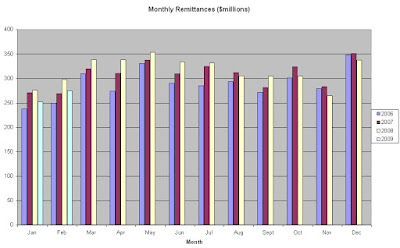The Economy -- Remittances decline
Remittances, the money Salvadorans abroad send back to family members in El Salvador, are falling as the economic downturn in the US and elsewhere impacts immigrant workers. The chart below was prepared from data maintained by El Salvador's Central Reserve Bank which tracks remittances on a monthly basis. (click on the image for a larger version).

What the chart shows is that from 2006 through 2008, each year remittances grew. But starting in August 2008, remittances are no longer higher each month than the remittance amount in the same month one year earlier. For 6 of the 7 months from August 2008 though February 2009, remittances were less than the previous year. The decline over that period is some $81.5 million from the corresponding period or a decrease of almost 4%.
This 4% decline represents a significant shift from the prior pattern of steadily increasing remittances. Since remittances have been perhaps the single greatest source of money to lift families in El Salvador out of poverty, this decline is worrisome, although not unexpected.

What the chart shows is that from 2006 through 2008, each year remittances grew. But starting in August 2008, remittances are no longer higher each month than the remittance amount in the same month one year earlier. For 6 of the 7 months from August 2008 though February 2009, remittances were less than the previous year. The decline over that period is some $81.5 million from the corresponding period or a decrease of almost 4%.
This 4% decline represents a significant shift from the prior pattern of steadily increasing remittances. Since remittances have been perhaps the single greatest source of money to lift families in El Salvador out of poverty, this decline is worrisome, although not unexpected.
Comments
Interesting stuff. Check out this post and chart I did on March 20th that shows just how important remittances are for El Salvador.
http://www.incakolanews.blogspot.com/2009/03/remittances-in-latam-2008-chart-of-day.html
There's a real problem brewing here.
In short, remesas were a valuable stop gap measure, but they could not be a viable long term plan.
-Stephanie